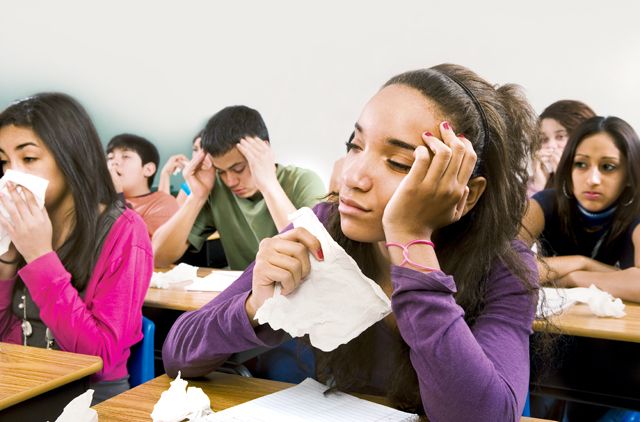School summer holidays conjure up picture-postcard moments of idyllic times spent away from stuffy classrooms, homework, exams and mundane routine. It's also the time that rules are bent and schedules are not adhered to, travelling either back home to visit family or to cooler climes to escape the heat.
And after all the fun, getting back to school is greeted with trepidation and excitement, with parents feeling the pressure to keep their children healthy, as the first few weeks of the new term inevitably bring with it bouts of throat infection, the sniffles, asthma attacks and even bad cases of head lice.
"Growing children have an increased rate of cell production and multiplication, but also a less developed metabolism that will increase the level of exposure to illness," says Dr Meena Karle, Specialist Paediatrician, Welcare Clinic Ibn Battuta.
Explaining why this happens is Dr Shoaib Shahzad Khan, Head of Paediatrics and Neonatology, Canadian Specialist Hospital. "While on vacation children are exposed to several new environments, new viruses and bacteria. Staying in hotels or resorts exposes them to common swimming pools, crowded areas and public transport, making kids more prone to respiratory, gastric and ENT infections, allergies and skin problems."
Here we look at the most common diseases that children contract, which parents need to watch out for.
Colds and sinusitis
One of the ailments is the common cold that will run its course or a complicated sinus infection that may need aggressive treatment. "If your child has a history of sinusitis and comes down with a cold, you might think the doctor should prescribe an antibiotic, but keep in mind that even a sinusitis that looks like a cold will be first treated for the cold symptoms," says Dr Khan.
"If the situation hasn't improved or gets worse after ten to 14 days, then it warrants a more aggressive approach. Physicians try very hard not to use antibiotics inappropriately because it increases bacterial resistance."
Sore throat and cough
This is a common illness in children returning from their holidays. Clinically, it is diagnosed as pharyngitis or tonsillitis and is mainly streptococcal infection spread through respiratory secretion, says Dr Karle.
It is characterised by mild viral infections involving the upper respiratory tract resulting in a sore throat, difficulty in swallowing, and distressed coughing. "For these problems usually antibiotics are not prescribed. Mild antihistamines, some cough syrups and gargles are all that is required," says Dr Khan.
Diarrhoea and vomiting
While on vacation it is very easy to be lax about dietary habits, says Dr Khan. "There is every possibility that children might eat something that was not properly cleaned and cooked or cooked under unhygienic conditions.
They can contract either food poisoning or viral infections of the gut resulting in diarrhoea and vomiting. These ailments can be avoided by choosing clean places to eat and washing hands well before and after a meal." The main thing to keep in mind is proper and timely rehydration of children.
Allergies and skin rashes
Dr Khan says that there is a high incidence of allergic disorders in the region. "Children on vacation to different countries commonly acquire allergic skin disorders with itchy rashes. Again mild antihistamines and antipruritic creams are enough to cure these mild ailments."
The most common skin allergy is called atopic dermatitis, says Dr Karle. This could be due to dry heat and chemicals from swimming pools that aggravate the baseline eczema symptoms, which lead to itchy rashes. In this case, says Dr Karle, avoid exposure to the heat, use a good skin moisturiser, stay well hydrated, antihistamines may also be administered, and in case of a flare-up, use local steroids.
Conjunctivitis
This appears as discomfort and redness in the eye, often with a discharge and itchiness. "It's not easy for the school nurse to tell whether the condition is due to allergies (red, itchy, watery eyes can also accompany hay fever) or infection. If in doubt, the child should be sent home and checked out by a physician," says Dr Khan. The child must be on medication for 24 hours before returning to school.
A viral infection is often the cause of conjunctivitis, in which case antibiotics will not help. It will clear up on its own. Antibacterial drops may be prescribed if it is caused by bacteria. Preventive measures such as washing hands regularly and not sharing personal items will keep an infection from spreading.
Asthma
It is a major cause for kids missing school. It is generally treated with preventive medication. The effectiveness of inhaled steroids or medication increases with use over time, reducing the likelihood of respiratory infections or environmental changes triggering asthma. It is prudent for parents to develop an individualised asthma action plan with the school nurse, says Dr Khan. Make the nurse aware of triggers, symptoms, medication, and what works for your child.
Make sure your child has medication and devices to manage the asthma and knows what to do and whom to turn to in case of an attack. All members of the school team in contact with your child should know what to do if the asthma gets out of control.
Head lice
Several myths persist about head lice. It is not a sign of poor hygiene, kids don't get them from pets, and they don't jump. Mainly they crawl from one head to another, feed on blood, and lay eggs, called nits, that hatch in one to two weeks.
"Getting rid of head lice can be challenging. FDA-approved anti-lice treatments (shampoos and creams) are sufficient. Don't try dangerous home remedies such as gasoline or a plastic bag over the child's head. Check family members for lice, and keep your infested child from sharing pillows or combs," says Dr Khan.
Combat the sniffles and sneezes
GN Focus speaks to experts to find ways of preventing and treating common ailments














